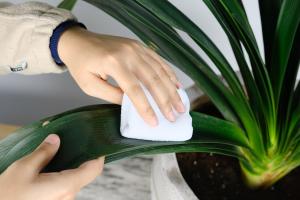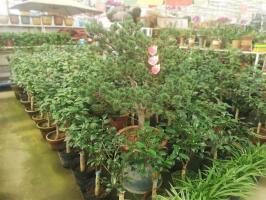Introduction
Potted plants are a great way to add life and greenery to our homes and offices. They are relatively easy to care for and can thrive in a variety of environments. However, one of the biggest mistakes people make when caring for their potted plants is overwatering them. In this article, we will explore what happens if a potted plant is overwatered and how to avoid it.
What happens if a potted plant is overwatered?
Overwatering a potted plant can have detrimental effects on its health. Too much water in the soil can suffocate the roots, preventing them from getting the air they need to function properly. This can lead to root rot, a condition where the roots become mushy and infected with harmful bacteria and fungi. Additionally, overwatering can lead to mold growth, which can spread to other parts of the plant and cause it to decline rapidly.
Signs of overwatering
It's essential to know the signs of overwatering in potted plants so you can take action before it's too late. The following are some signs to look out for:
Yellowing or wilting leaves
Moldy or smelly soil
Drooping stems
Roots growing out of the drainage holes
Slow growth or stunted growth
If you notice any of these signs, it's likely that your potted plant is being overwatered, and you should take action immediately.
How to avoid overwatering
Preventing overwatering in potted plants is relatively easy if you follow some basic guidelines. Firstly, make sure the pot you choose has enough drainage holes to allow excess water to drain away freely. Secondly, use the correct soil mix. A good potting mix should be well-draining and have plenty of air pockets. Thirdly, water your plants less frequently, and only when the soil is dry to the touch. Finally, pay attention to the environment in which your plants grow. Some plants prefer drier conditions, while others thrive in humidity.
How to revive an overwatered plant
If you suspect your potted plant is suffering from overwatering, there are steps you can take to try and revive it. The first thing to do is to remove it from the pot and inspect the roots. If they are brown, slimy, or smell bad, you need to cut away the affected roots with clean shears. Repot the plant into a clean pot with fresh soil mix, then water it sparingly. It's essential to avoid overwatering it again until it has recovered fully.
Conclusion
In conclusion, overwatering can be disastrous for potted plants, leading to root rot, mold growth, and other issues that can cause them to decline rapidly. It's essential to know the signs of overwatering and take action before it's too late. With proper care, your potted plants can thrive and provide you with joy for years to come.

 how many times do yo...
how many times do yo... how many planted tre...
how many planted tre... how many pine trees ...
how many pine trees ... how many pecan trees...
how many pecan trees... how many plants comp...
how many plants comp... how many plants can ...
how many plants can ... how many plants and ...
how many plants and ... how many pepper plan...
how many pepper plan...































